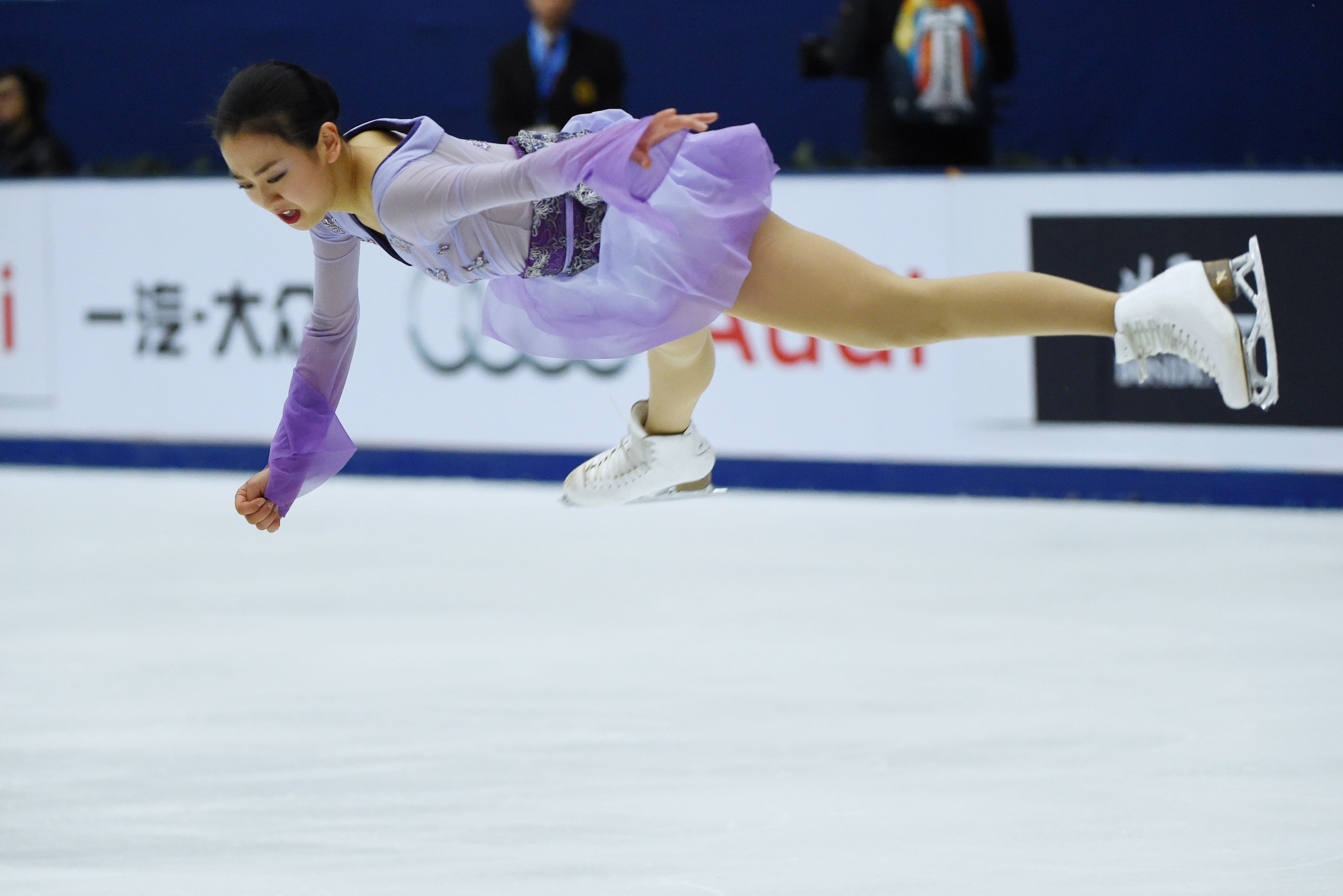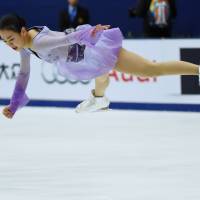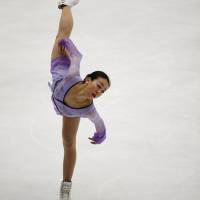"It's just the same as Patrick Chan last week. It's as if she has never been away. In fact, it looked fresher than ever."
Three-time world champion Mao Asada made a splash with her short program in her return to official competition at the Cup of China on Friday and an announcer from Eurosport2 captured the opinion of many in their first look at Japan's skating icon.
Mao looked sharp in a fuchsia outfit and began her skate with her trademark triple axel on the way to a healthy lead of nearly six points over compatriot Rika Hongo. Competing to "Bei mir bist du schoen," with a nicely choreographed program by Lori Nichol, Mao appeared poised and confident.
Though she had some problems with her free skate (where she finished third) to "Madame Butterfly" on Saturday, considering she had not skated back-to-back programs for more than 18 months, the feeling here is that her victory represented a good start in her bid for a fourth world title.
Mao fell on her triple flip/triple loop combination in the free skate, was marked down for under-rotating the back end of her double axel/triple toe loop combo, then doubled a planned triple lutz and later singled a triple flip.
So there is definitely work to be done, but with the triple axel seemingly back under control after the difficulties of the 2013-14 season, the outlook is promising for Mao.
"I am not satisfied with my free skating today as I didn't do all elements," Mao was quoted as saying by the ISU website. "I have some problems to solve. I won thanks to my short program but it doesn't satisfy me to have won this way."
The 2018 Pyeongchang Olympics are still 27 months away, but after the frustrations in Vancouver and Sochi it's hard not to wonder about the 25-year-old Mao's chances in South Korea.
Ice Time gets a bit emotional just thinking about it. Many writers, including myself, have been covering Mao for more than 10 years now. We have known her since she was a young girl and have watched her grow into a mature woman.
Writers are supposed to be objective, but it's not always easy. We are, after all, human. Just ask those who have followed the careers of Michael Jordan or Muhammad Ali.
It's not just their achievements that grab you, it's their charisma and flair for the dramatic that also resonate.
"With all the highs and lows in a remarkable 10-season senior career, Mao Asada is by far the most compelling champion since @MichelleWKwan," tweeted Chicago Tribune's Phil Hersh, one of the top skating writers in the world, after Mao's short program in Beijing.
Ice Time has taken a fair amount of static over the years for criticizing Mao at times, but that comes with the territory. The job is to chronicle and analyze the performances, not lead a cheering section.
Does Mao really want to put herself through this again?
That is the big question.
Six months in skating can be an eternity, but judging from what we saw in Beijing, Mao appears both refreshed and resilient. Presuming that she remains healthy, there is no reason why Mao could not win the gold in Pyeongchang.
Mao was clearly devastated after taking the silver medal behind Yuna Kim in 2010 and finishing sixth at the Sochi Games last year. Disappointment is difficult for anybody to handle. To have it happen with hundreds of millions of people watching, and the hopes of a nation hanging on it, can only be described as immense.
"My feelings are much more geared toward the next event, but the Olympics are at the back of my mind," Mao was quoted as saying by Kyodo after Sunday's exhibition.
It's still early days, but I would not bet against Mao winning skating's holy grail. It used to be that skaters her age were long retired, but with the advancements in training and nutrition, that is no longer the case.
We saw Carolina Kostner take the bronze medal in Sochi at 27 and Akiko Suzuki win Japan's national title at 28 during the 2013-14 season.
With her victory in China, Mao has now won 15 Grand Prix events. The only woman who has won more is Russia's Irina Slutskaya with 17.
Mao also established another new mark with her triumph, becoming the first skater to win all seven of the current Grand Prix events.
What will Mao's place in skating history be?
Tweeting that "my criteria lean heavily on Olympic and world titles and impact on the sport," Hersh listed his best female skaters of the past 70 years.
"My current top five since WWII would include Yuna Kim, Katarina Witt, Michelle Kwan, Carol Heiss Jenkins, Peggy Fleming," Hersh tweeted.
Notable by her absence was Mao.
What do four of the five skaters Hersh listed have that Mao doesn't?
An Olympic gold medal.
Kwan does not, but her five world titles put her in an elite class with just a handful of others.
Regardless of how it all turns out, the next couple of years are going to be full of compelling drama, which is exactly what skating needs. The sport should thank its lucky stars that Mao has decided to carry on.
Overlooked: Lost in the glare of Mao's return was a rousing performance by Hongo, who earned the silver medal in Beijing. She skated powerfully in her short program to "Incantation," which was choreographed very nicely by Suzuki.
The 19-year-old Hongo then outdid herself by winning the free skate to "Riverdance" with a crowd-pleasing effort in a dark-green, sequined outfit. She displayed great energy while hitting seven triple jumps and received a personal-best score of 129.97 points.
"I loved it. The costuming was great. The choice was great. The phrasing of the overall performance was great," said one of the Eurosport2 announcers following Hongo's free skate.
"I felt very happy at the end of my program, because I gave my best performance. I didn't pay so much attention to my ranking," Hongo commented, according to the ISU website.
On tap: The GP series moves to Bordeaux, France, this week for the Trophee Bompard, where Japan will be represented by Kanako Murakami and Haruka Imai on the women's side, and Daisuke Murakami and Shoma Uno on the men's.
Kanako Murakami will look to improve on her fourth-place finish at Skate Canada, while Daisuke Murakami (third at Skate Canada) and Shoma Uno (second at Skate America) will be seeking to bolster their chances of making the GP Final next month in Barcelona, Spain.



















With your current subscription plan you can comment on stories. However, before writing your first comment, please create a display name in the Profile section of your subscriber account page.